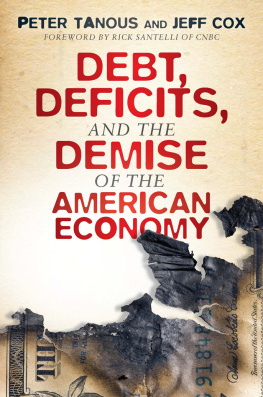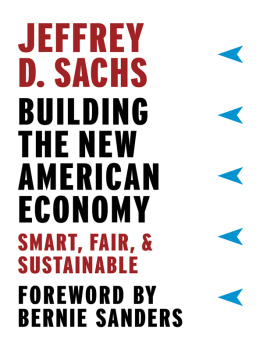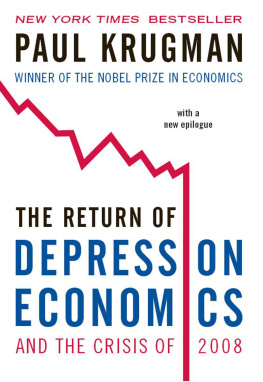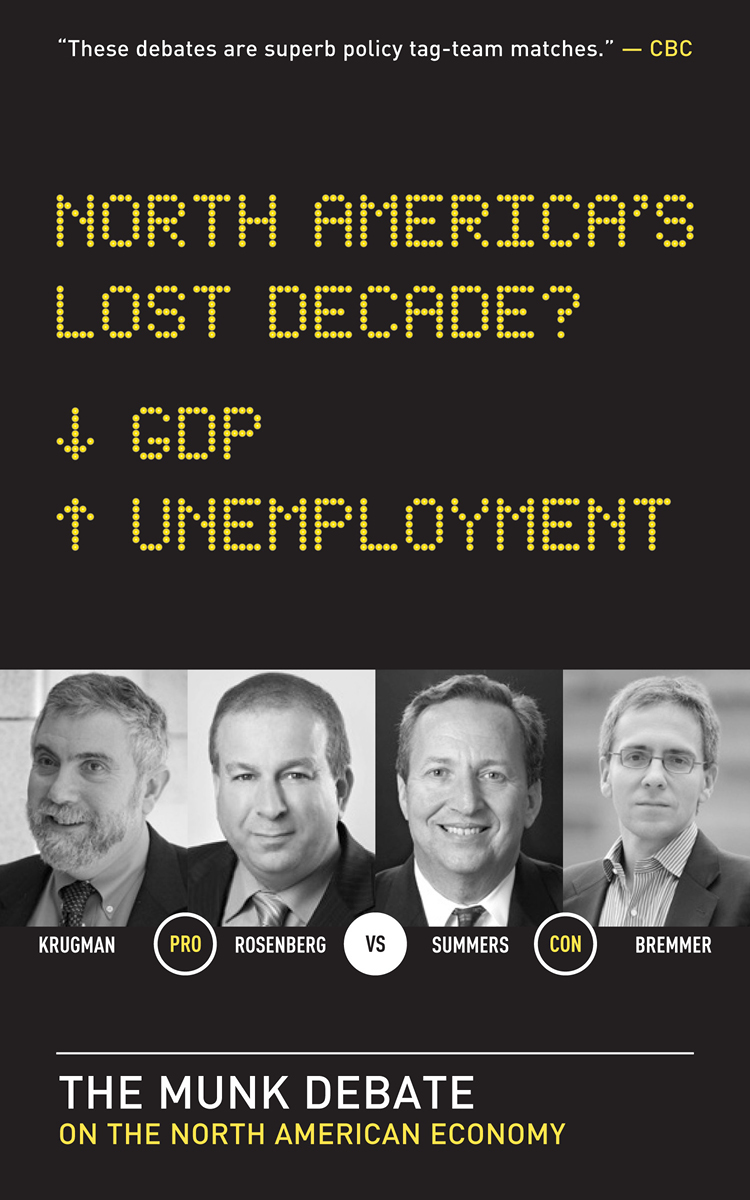NORTH AMERICAS
LOST DECADE?
_______________
PAUL KRUGMAN AND DAVID ROSENBERG
VS. LAWRENCE SUMMERS AND IAN BREMNER
_______________
THE MUNK DEBATE ON THE NORTH AMERICAN ECONOMY
EDITED BY RUDYARD GRIFFITHS AND PATRICK LUCIANI
Copyright 2012 Aurea Foundation
Paul Krugman in Conversation, by Brian Milner. Copyright 2011, Globe and Mail
Lawrence Summers in Conversation, by Brian Milner. Copyright 2011, Globe and Mail
All rights reserved. No part of this publication may be reproduced ortransmitted in any form or by any means, electronic or mechanical, includingphotocopying, recording, or any information storage and retrieval system, withoutpermission in writing from the publisher.
Distribution of this electronic edition via the Internet or any other means without the permission of the publisher is illegal. Please do not participate in electronic piracy of copyrighted material; purchase only authorized electronic editions. We appreciate your support of the authors rights.
This edition published in 2012 by
House of Anansi Press Inc.
110 SpadinaAvenue, Suite 801
Toronto, ON, M5V2K4
Tel. 416-363-4343
Fax 416-363-1017
www.houseofanansi.com
LIBRARY AND ARCHIVES CANADA CATALOGUING IN PUBLICATION
North Americas lost decade? : the Munk debate on the North American economy /
Rudyard Griffiths and Patrick Luciani, editors.
(The Munk debates)
Based on the Be it resolved North America faces a Japan-style
era of high unemployment and slow growth,
Munk Debate held on Nov. 14, 2011.
eISBN 978-1-77089-201-9
1. North America Economic conditions. 2. United States Economic conditions 2009-.
3. United States Economic conditions 20012009. I. Griffiths, Rudyard II. Luciani, Patrick III. Series: Munk debates
HC95.N659 2011 330.9700541 C2011-907741-8
Library of Congress Control Number: 2011943046
Cover design: Alysia Shewchuk
Transcription: Rondi Adamson
Cover photograph: Getty Images

We acknowledge for their financial support of our publishingprogram the Canada Council for the Arts, the Ontario Arts Council, and theGovernment of Canada through the Canada Book Fund.
INTRODUCTION BY PETER MUNK
The United States and the world are still suffering the consequences of the financial crises that started in late 2008. With slow economic recovery, high unemployment, collapsing equity and real estate prices, a growing national debt, and a politically divided Congress, the United States is struggling to find the right policies to get its economy back on track. And even though Canada has managed to avoid the worst of the financial crisis, if the United States doesnt get it right, we will all be in for a difficult time.
That was the background to the eighth semi-annual Munk Debate held at Roy Thomson Hall in Toronto on November 14, 2011, before an audience of 2,700 with many thousands more following online. The resolution that night was Be it resolved North America faces a Japan-style era of high unemployment and slow growth. Is the same fate awaiting the United States as it grapples with a similar crisis that threatens to bring down its economy? Or will Americas creativity, ingenuity, and free markets rally to find solutions to overcome the worst financial and economic crisis since the Great Depression?
Americas challenge is made more difficult as the European experiment, with its common currency, comes under tremendous stress as member countries struggle to get their debt levels under control. And whatever one thinks of the Occupy Movement and its bizarre mixture of social, political, and economic messages, it has one complaint in common with the Tea Party movement: something has to be done to restrain the risk-taking and excesses of the financial sector so that it doesnt bring the real economy down with it. As with Japan, both the eurozone and the United States have accumulated massive public debt as a result of bailouts and fiscal stimuli while revenues have declined. What makes matters more concerning is that the United States has never had a recovery without the help of a surge in the real estate market, but a strong recovery in housing doesnt seem likely any time soon.
Four exceptional thinkers were selected to debate these crucial issues. Arguing for the resolution was Nobel laureate Paul Krugman and economist and investment strategist David Rosenberg.
Anyone who keeps up with the American political scene and economy knows the work of Paul Krugman. Not only does he write a highly influential New York Times column, but he is also Professor of Economics at Princeton University. For his scholarship he was awarded the Nobel Prize in Economics in 2008. Dr. Krugman is a bestselling author of a number of acclaimed books and an acknowledged expert and observer of the Japanese economy. Paul Krugman reminds us that the situation in the United States is far worse than that of Japan in the early 1990s, and he doesnt see a solution as long as there is a deadlock between the Republicans and Democrats on economic policy. He also makes the argument that following a financial crisis at least since WWII countries have only recovered by running large trade surpluses, an option not open to the United States.
Debating with Dr. Krugman is Canadian David Rosenberg, Chief Economist and Strategist of the Toronto-based wealth management firm Gluskin Sheff and Associates. David also served as Chief North American Economist at Bank of America Merrill Lynch. An exceptional analyst, he is one of only a handful of economists who predicted the slow pace of the post-crisis recovery and the stark reversal in stock valuations. Mr. Rosenberg is right to remind us that massive fiscal stimulus in the United States wont be effective in getting the economy to grow in the face of a massive consumer de-leveraging of private debt.
Arguing against the resolution were Lawrence Summers and Ian Bremmer who believe that North Americas economy and institutions are flexible enough to weather the current storm. Lawrence Summers came to this debate with a sterling reputation as an economic scholar and public servant, and I am personally gratified that he accepted our invitation to participate. He is also a respected economic theorist who served as President of Harvard University, Chief Economist at the World Bank, and as Secretary of the Treasury of the United States under President Bill Clinton. More recently, he served as director of President Obamas National Economic Council.
Dr. Summers holds the opposing view that the housing collapse and the drop in the stock market in Japan during the 1990s were much deeper than they are in the United States today. He doesnt view the political crisis in the United States as pessimistically as the pro side, he believes that America is still the place where everyone with ambition, creativity, and hope wants to come to live and invest, despite its economic problems.
Ian Bremmers intelligence, insight, and wisdom as a political analyst belie his age. He is a bestselling author and an insightful commentator on politics and the economy in the United States, and over the last decade, he has started and turned his Eurasia Group into a leading global risk research and consulting firm. Mr. Bremmer admits that the United States is facing deficit and unemployment issues, but he argues that when the world gets nervous they always turn to the US dollar as a safe haven, a huge economic benefit not available to Japan.








